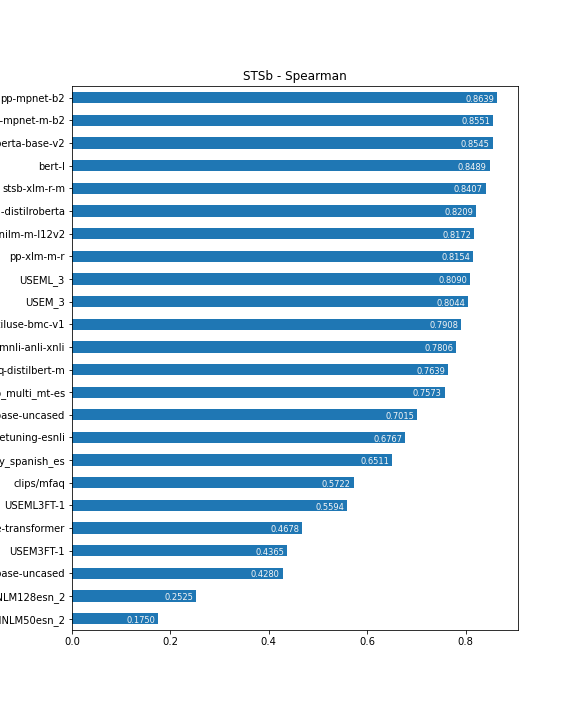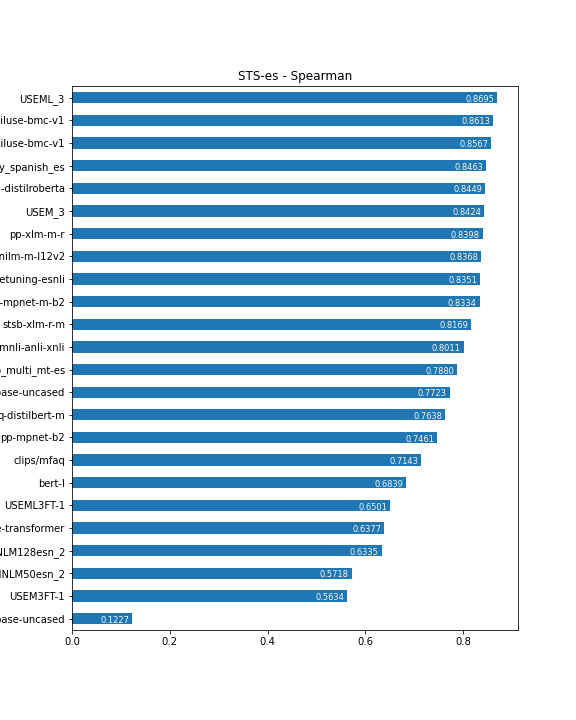This is a small framework aimed to make easy the evaluation of Language Models with the STS Benchmark as well as other task-specific evaluation datasets. With it you can compare different models, or versions of the same model improved by fine-tuning. The framework currently use STSBenchmark, the Spanish portion of STS2017 and an example of a custom evaluation dataset (WIP).
The framework wraps models from different sources and runs the selected evaluation with them, producing a standarized JSON output.
Models can be sourced from:
- Tensorflow Hub, embedding models
- SBERT Sentence Transformers
- HuggingFace models - IN DEVELOPMENT!!!
The main goal of this framework is to help in the evaluation of Language Models for other context-specific tasks.
TODO Example with STS for product names or ad titles
Check this notebook for the current results of evaluating several LMs on the standard datasets and in the context-specific example. This results closely resembles the ones published in PapersWithCode and SBERT Pretrained Models
-
Build a docker image with all dependecies already integrated from this repository
-
Clone this repo, and run the prebuilt docker image inside it. (See
denv.shin the mentioned repo) -
Use the main script sts_evaluation.py with the following parameters:
-
Evaluator type:
tfhubfor Tensorflow Hub models that can embed strings directlysentfor SentenceTransormers modelshffor HuggingFace models that can embed strings as AutoML models
-
Model: use the URL, identifier or directory as required by the model.
-
Benchmark: See below for available datasets
stsb-[test|train|dev]for STSBenchmark specific datasetsts-esFor SentEval 2017 Spanish to Spanish
-
Optional, similarity metric:
cosine(default) oreuclidean. Euclidean similarity defined as1 / (1 + euclidean_distance)
-
Optional, tag: any tag that may help you to identify this particular run.
-
tf-docker /root > python sts_evaluation.py sent stsb-roberta-base-v2 stsb-test cosine 2> /dev/null 1> results/stsb--stsb-roberta-base-v2.json
Output JSON example:
{
"class": "SentenceTransformerSTSEvaluator",
"model_url": "stsb-roberta-base-v2",
"data_filename": "data/stsbenchmark/sts-dev.csv",
"used_minimal_normalization": null,
"metric": "cosine",
"scaled_scores": null,
"evaluation": {
"pearson": {
"r": 0.8872942593119845,
"p-value": 0.0
},
"spearman": {
"rho": 0.8861646506975909,
"p-value": 0.0
}
},
"timestamp": "2021-06-14 23:13:05",
"metadata": [],
"tag": "stsb--roberta_base_v2-cosine",
"benchmark": "stsbenchmark"
}
http://ixa2.si.ehu.eus/stswiki/index.php/STSbenchmark
https://paperswithcode.com/sota/semantic-textual-similarity-on-sts-benchmark
For Spanish monolingual texts:

